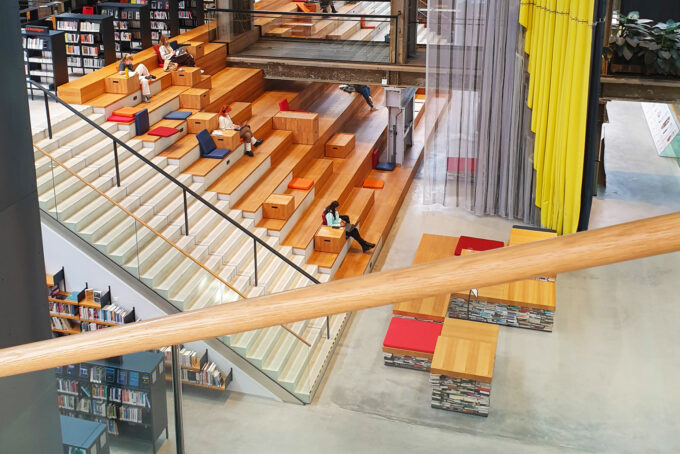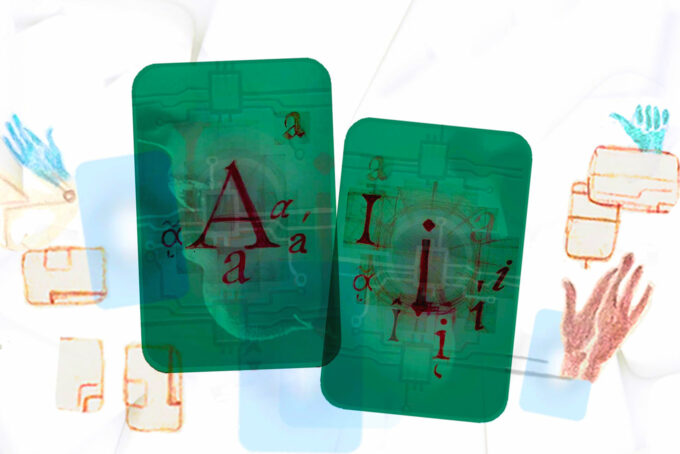
Digitalisation in Libraries: 5 Lessons from the Corona Crisis for the New Normal
Through COVID-19, the world suddenly became one huge shared experimental space. Even though the pandemic pushed many people all over the world to their limits - privately and professionally - most of them also saw it as an opportunity and tried to make the best of it. Corona was also the number one topic in the international EconBiz network. We invited the EconBiz partners to share their best practices and what they want to take with them into the post-Corona period. Here are their five learnings.
by Doreen Siegfried

What innovative push towards digitalisation in libraries worldwide has been ushered in by the coronavirus? What was digitalisation status at the beginning of the corona pandemic? What were the biggest challenges for infrastructure institutions? How were they solved? What were the “highlights” of the employees? What was the biggest “life hack” that an institution picked up from the corona crisis in the field of digitalisation? And what have you learned from it?
We recently put these and other questions to our partners in the international EconBiz network. In a detailed overview, eight infrastructure institutions from Singapore, France, Germany, the USA, Denmark, Malaysia and Turkey described their experiences and the most important lessons learned from the pandemic: Digitalisation in Libraries – To What Extent has Corona Given a Boost? In a short report we now introduce the five most important trends and lessons from the network, which are sure to be reflected all over the world as well.
Lesson #1: Virtual collaboration facilitates cross-location cooperation
Digital communication technologies have fundamentally changed teamwork in academic libraries. New patterns of behaviour have been created worldwide. Virtual meetings, break-out sessions, discussions with courtesy breaks, chats and working at a distance have been learned and are now part of the standard repertoire of collaboration in libraries.
The Aarhus University Library / The Royal Danish Library, for example, with its 900 employees spread across different locations in Denmark, has sustainably reduced the social distance between branches through digital tools. Thanks to virtual working with video conference systems, employees have grown together and will continue to use their new work tools. Susanne Dalsgaard Krag, library manager, writes:
„The pandemic has taught us to work together across departments and across the country in a way we would never have imagined. You can mention a lot of different things, we have learned during the pandemic, but I guess this is one of the biggest advantages, and something we will carry into the post pandemic world, which we all look forward to welcome.“
Lesson #2: Investing in human resource development pays off
What has become clear for all EconBiz partners throughout the globe is: We are living in new times. There will be no going back to a pre-corona era. Working according to prefabricated workflows was yesterday. What propelled the libraries forward were creative employees with the ability to adapt rapidly to continually new parameters and to accept this state of fluctuation. This awareness for working and living in a VUCA world – in other words a world determined by volatility, uncertainty, complexity and ambiguity – will also define personnel management in academic libraries in the post-corona era.
Rajen Munoo, Head of Learning and Engagement at Singapore Management University Libraries, stresses:
„Our biggest ‘life hack’ was upskilling – to ensure that all staff were ‘vaccinated’ with digital skills to be resilient and agile by providing them with opportunities to learn, unlearn and relearn through continuing professional development opportunities in this VUCA world.“
Corey Seeman, USA, University of Michigan, Kresge Library Services, summarises:
„Libraries will have a choice on the other end of this pandemic to keep the changes that have been implemented or revert back to their previous normal ways. The path forward will likely be a combination of these both, but it is important to embrace these changes as a way to a more modern library.“
Lesson #3: Good networks are crucial for fast and stable solutions
Since the outbreak of the pandemic, infrastructure institutions have had to continually develop new solutions in order to keep hygiene regulations and health and safety measures. They therefore enter a dialogue not only with the authorities but also with other institutions on the campus or in the wider world. Those who are well connected here, can easily find common solutions. Rajen Munoo from the Singapore Management University Libraries, suggests:
„With the onset of the COVID-19 pandemic and the ever-changing directives from various agencies, our priority was collaborating with campus partners in order to comply with the health and safety protocols“.
Lesson #4: Empathy for users promotes creativity
Those who deal with the needs and wishes of users in an empathic way will also find creative solutions. This is suggested by a study from the University of Cambridge. The experiences of the EconBiz partners also reveal that creative solutions are found wherever libraries show empathy for the fears and insecurities of students – no matter whether they are freshers or advanced students. In Singapore, for example, the libraries use “peer advisors” to dispel the fears of the new students taking part in an online semester for the first time with a peer-to-peer learning programme.
Christine Okret-Manville from the Université Paris Dauphine-PSL Bibliothèque in France writes:
„To help our readers make the most of all these resources, we put a series of tutorials for self-training online (bilingual). We quickly put up virtual training sessions. […] In this difficult period, we had to show an especially supportive behaviour towards one another to manage adapting quickly to unusual work conditions. Yet it gave us an opportunity to increase and diversify our services, introducing virtuality where we didn’t use it enough or at all yet, and giving us new leads to expand our activity.“
And also Corey Seeman from the Kresge Library Services in Michigan can gain something from new digital solutions beyond the current lockdown:
„Library instruction and consultations via Zoom will likely continue. One of the challenges we would have is finding a space that could work for meetings. By using Zoom, the need for space mostly goes away.“
In an international online poster session organised by Koç University (Turkey), many ideas were presented on how to stay in touch with employees but also with students – from motivational emails to online pet therapy with various animals.
Lesson #5: Digital first is measurably worth it
Many libraries from the EconBiz partner network had already made a large quantity of electronic resources accessible even before lockdown. Propelled by COVID-19, they once again improved their digital services and found solutions for even more accessible e-media. Christine Okret-Manville from Paris:
„Our priority has been to extend the size and availability of our electronic collection: we offered remote access to the financial databases which were only available on site, tested new textbook databases and other sources. We dedicated a section of our website to resources publishers could open freely during that time.“
Vasiliki Mole from Koç University in Turkey also reports on the considerable efforts – both to enable students to access electronic media as well as to create enthusiasm for new possibilities.
„Sometimes, the comfort zone of years’ old practices is hard to overcome, as it creates a somewhat stiff acceptance of a new perspective. A rather difficult issue we have finally come to a point to change, has been the traditional print textbooks and their replacement with online publications.“
Deborah Wallace from the Harvard Business School’s Baker Library (USA) emphasises that the effort pays off in very clear indicators:
„As a result, almost every one of our services and information product use volumes have increased. For example, Baker Library website use by MBA students +73% and alumni +43%, database use +76%, Working Knowledge, readership +51%, and Books@Baker participants +90%.“
You can read about the experiences of the individual EconBiz partners in detail here: Digitalisation in Libraries: To What Extent has Corona Given a Boost?
About the EconBiz partner network:
The EconBiz partner network is an international network of libraries and research institutions focusing on economics studies. Its mission is to enable top research in economics and business studies through easy access to quality subject information in combination with state-of-the art search-features. The network promotes the transfer of knowledge and cooperation among members worldwide. Its mission is to enable top research in economics and business studies through easy access to quality subject information in combination with state-of-the art search-features. The network helps to promote the service on an international level and to enhance the visibility of research output and conferences in all partner countries. It also provides a forum for the discussion of topics relevant to the partners. Answers to questions as well as partners for joint projects can be found through the network.
This might also interest you
- The Impact of Covid-19 on Research Libraries Across Europe
- Digital libraries and COVID-19, Part 1: responding to a global emergency – Digital Library Perspectives
- Innovation during crisis: exploring reaction of Swedish university libraries to COVID-19
- COVID-19 and digital library services – a case study of a university library
- Silver lining of the COVID-19 crisis for digital libraries in terms of remote access
Further articles by Doreen Siegfried
- Exhibition Open UP! How digitisation is transforming science
- Putting open science into practice: ZBW research data projects
- Podiums Discussion: Perspectives for „Libraries 2050“
- Student survey: What is the level of information literacy like?
- Open Economics: Study on Open Science Principles and Practice in Economics
- Workshop: How to Make Open Science Practice Attractive in the Economic Sciences
- Open data, open access, new formats for publications: the future for Economics research?
This article also appeared in the 2020 ZBW Annual Review “Open” (PDF) that highlights developments at the ZBW, among other things: Research Data Management, Open Science and organised knowledge.
This text has been translated from German.
Dr Doreen Siegfried is Head of Marketing and Public Relations. She can also be found on LinkedIn and Twitter.
Portrait: ZBW©
View Comments

Nudging Open Science: Useful Tips for Academic Libraries?
Nudging is an approach used in behavioural research to bring about certain positive...



